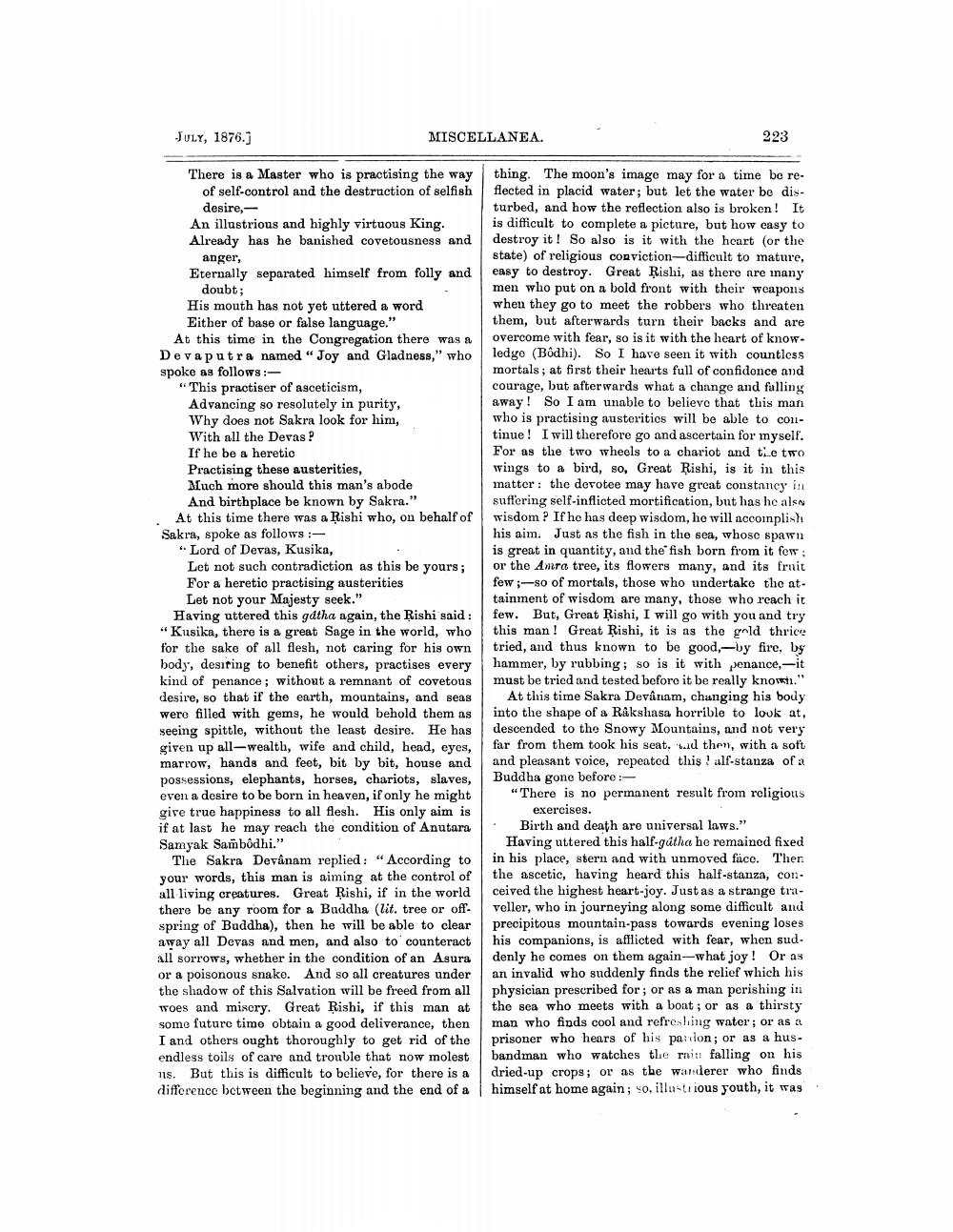________________
JULY, 1876.]
There is a Master who is practising the way of self-control and the destruction of selfish desire,
MISCELLANEA.
An illustrious and highly virtuous King. Already has he banished covetousness and anger,
Eternally separated himself from folly and doubt;
His mouth has not yet uttered a word Either of base or false language."
At this time in the Congregation there was a Devaputra named "Joy and Gladness," who spoke as follows:
"This practiser of asceticism,
Advancing so resolutely in purity, Why does not Sakra look for him, With all the Devas?
If he be a heretic
Practising these austerities,
Much more should this man's abode
And birthplace be known by Sakra."
At this time there was a Rishi who, on behalf of Sakra, spoke as follows:
"Lord of Devas, Kusika,
Let not such contradiction as this be yours; For a heretic practising austerities Let not your Majesty seek."
Having uttered this gatha again, the Rishi said: "Kusika, there is a great Sage in the world, who for the sake of all flesh, not caring for his own body, desiring to benefit others, practises every kind of penance; without a remnant of covetous desire, so that if the earth, mountains, and seas were filled with gems, he would behold them as seeing spittle, without the least desire. He has given up all-wealth, wife and child, head, eyes, marrow, hands and feet, bit by bit, house and possessions, elephants, horses, chariots, slaves, even a desire to be born in heaven, if only he might give true happiness to all flesh. His only aim is if at last he may reach the condition of Anutara Samyak Sambodhi."
The Sakra Devânam replied: "According to your words, this man is aiming at the control of all living creatures. Great Rishi, if in the world there be any room for a Buddha (lit. tree or offspring of Buddha), then he will be able to clear away all Devas and men, and also to counteract all sorrows, whether in the condition of an Asura or a poisonous snake. And so all creatures under the shadow of this Salvation will be freed from all woes and misery. Great Rishi, if this man at some future time obtain a good deliverance, then I and others ought thoroughly to get rid of the endless toils of care and trouble that now molest ns. But this is difficult to believe, for there is a difference between the beginning and the end of a
223
thing. The moon's image may for a time be reflected in placid water; but let the water be disturbed, and how the reflection also is broken! It is difficult to complete a picture, but how easy to destroy it! So also is it with the heart (or the state) of religious conviction-difficult to mature, easy to destroy. Great Rishi, as there are many men who put on a bold front with their weapons when they go to meet the robbers who threaten them, but afterwards turn their backs and are overcome with fear, so is it with the heart of knowledge (Bôdhi). So I have seen it with countless mortals; at first their hearts full of confidence and courage, but afterwards what a change and falling away! So I am unable to believe that this man who is practising austerities will be able to continue! I will therefore go and ascertain for myself. For as the two wheels to a chariot and the two wings to a bird, so, Great Rishi, is it in this matter: the devotee may have great constancy in suffering self-inflicted mortification, but has he also wisdom? If he has deep wisdom, he will accomplish his aim. Just as the fish in the sea, whose spawn is great in quantity, and the fish born from it few: or the Amra tree, its flowers many, and its fruit few; so of mortals, those who undertake the attainment of wisdom are many, those who reach it few. But, Great Rishi, I will go with you and try this man! Great Rishi, it is as the gold thrice tried, and thus known to be good, by fire, by hammer, by rubbing; so is it with penance,-it must be tried and tested before it be really known."
At this time Sakra Devânam, changing his body into the shape of a Rakshasa horrible to look at, descended to the Snowy Mountains, and not very far from them took his seat, td then, with a soft and pleasant voice, repeated this! alf-stanza of a Buddha gone before:
"There is no permanent result from religious exercises.
Birth and death are universal laws." Having uttered this half-gátha he remained fixed in his place, stern and with unmoved face. Then the ascetic, having heard this half-stanza, conceived the highest heart-joy. Just as a strange traveller, who in journeying along some difficult and precipitous mountain-pass towards evening loses his companions, is afflicted with fear, when suddenly he comes on them again-what joy! Or as an invalid who suddenly finds the relief which his physician prescribed for; or as a man perishing in the sea who meets with a boat; or as a thirsty man who finds cool and refreshing water; or as a prisoner who hears of his panion; or as a husbandman who watches the rain falling on his dried-up crops; or as the wanderer who finds himself at home again; so, illustrious youth, it was




